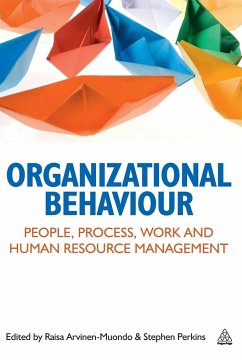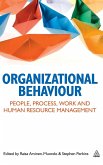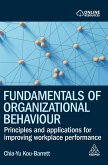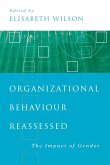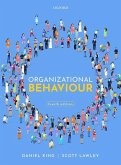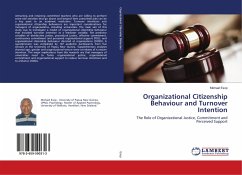- Broschiertes Buch
- Merkliste
- Auf die Merkliste
- Bewerten Bewerten
- Teilen
- Produkt teilen
- Produkterinnerung
- Produkterinnerung
Organizational Behaviour bridges the gap between OB and HRM, and the interrelated nature of these fields of study that are more often than not treated separately. Helping the reader to relate the OB canon to their experiences in the world of work and organizations and prompting them to question the way relationships around employment are managed within these institutions.Key features include: Linking OB, employment and HRM throughout Examining the role of corporate governance in shaping the scope of managerial choices in organizations. Studying the ethical dimensions of OB which is…mehr
Andere Kunden interessierten sich auch für
![Organizational Behaviour Organizational Behaviour]() Raisa Arvinen-MuondoOrganizational Behaviour161,99 €
Raisa Arvinen-MuondoOrganizational Behaviour161,99 €![Fundamentals of Organizational Behaviour Fundamentals of Organizational Behaviour]() Chia-Yu Kou-BarrettFundamentals of Organizational Behaviour164,99 €
Chia-Yu Kou-BarrettFundamentals of Organizational Behaviour164,99 €![Organizational Behaviour Reassessed Organizational Behaviour Reassessed]() Elisabeth M Wilson (ed.)Organizational Behaviour Reassessed77,99 €
Elisabeth M Wilson (ed.)Organizational Behaviour Reassessed77,99 €![Organizational Behaviour Organizational Behaviour]() Daniel KingOrganizational Behaviour57,99 €
Daniel KingOrganizational Behaviour57,99 €![Organizational Behaviour and Change in Europe Organizational Behaviour and Change in Europe]() Francoise Chevalier / Michael Segalla (eds.)Organizational Behaviour and Change in Europe77,99 €
Francoise Chevalier / Michael Segalla (eds.)Organizational Behaviour and Change in Europe77,99 €![Organizational Behaviour and Change in Europe Organizational Behaviour and Change in Europe]() Francoise Chevalier / Michael Segalla (eds.)Organizational Behaviour and Change in Europe232,99 €
Francoise Chevalier / Michael Segalla (eds.)Organizational Behaviour and Change in Europe232,99 €![Organizational Citizenship Behaviour and Turnover Intention Organizational Citizenship Behaviour and Turnover Intention]() Michael EsopOrganizational Citizenship Behaviour and Turnover Intention36,99 €
Michael EsopOrganizational Citizenship Behaviour and Turnover Intention36,99 €-
-
-
Organizational Behaviour bridges the gap between OB and HRM, and the interrelated nature of these fields of study that are more often than not treated separately. Helping the reader to relate the OB canon to their experiences in the world of work and organizations and prompting them to question the way relationships around employment are managed within these institutions.Key features include: Linking OB, employment and HRM throughout Examining the role of corporate governance in shaping the scope of managerial choices in organizations. Studying the ethical dimensions of OB which is increasingly important in the context of 'good employers' and global employment standards.
Hinweis: Dieser Artikel kann nur an eine deutsche Lieferadresse ausgeliefert werden.
Hinweis: Dieser Artikel kann nur an eine deutsche Lieferadresse ausgeliefert werden.
Produktdetails
- Produktdetails
- Verlag: Kogan Page
- Seitenzahl: 362
- Erscheinungstermin: 3. Januar 2013
- Englisch
- Abmessung: 234mm x 156mm x 20mm
- Gewicht: 550g
- ISBN-13: 9780749463601
- ISBN-10: 0749463600
- Artikelnr.: 36054849
- Herstellerkennzeichnung
- Libri GmbH
- Europaallee 1
- 36244 Bad Hersfeld
- gpsr@libri.de
- Verlag: Kogan Page
- Seitenzahl: 362
- Erscheinungstermin: 3. Januar 2013
- Englisch
- Abmessung: 234mm x 156mm x 20mm
- Gewicht: 550g
- ISBN-13: 9780749463601
- ISBN-10: 0749463600
- Artikelnr.: 36054849
- Herstellerkennzeichnung
- Libri GmbH
- Europaallee 1
- 36244 Bad Hersfeld
- gpsr@libri.de
Raisa Arvinen-Muondo works in HR management in Luanda, Angola. She has undertaken doctoral research at the University of Bedfordshire, on the career development of Angolan professionals within Western multinational organizations, focusing on the impact of experiences associated with international living. Stephen J Perkins is Dean of London Metropolitan Business School and a Visiting Research Fellow at Cass Business School. In addition to having served in several universities, he has held senior management posts in industry at times of transformational change and consulted with private and state-owned organizations internationally.
Contributors
Part One: Introduction
Introduction
Stephen J Perkins and Raisa Arvinen-Muondo
Learning objectives
Managing others to a purpose
How did OB get onto the management curriculum?
Definition of OB
Definition of HRM
Overview of the chapters to follow
Conclusion
Key learning points and conclusions
Discussion questions
Part Two: Individuals at work under an employment relationship
01 Managing diverse identities at work
Janice Johnson and Christina Schwabenland
Learning objectives
Introduction
Key concepts and debates in diversity management
Case study and discussion questions
Key concepts and debates - summary
Processes of identity formation at work
Processes of identity formation - summary
Diversity in a global context
Key learning points and conclusions
Case study and discussion questions
02 Perception, making decisions and people management
Raisa Arvinen-Muondo
Learning objectives
Introduction
Social perception and cultural perspectives
Perception
Common errors of perception
Decision making
Implications for HR practice and people management
Key learning points and conclusions
Case study and discussion questions
03 Motivation at work: engagement and facilitation
Nahid Rozalin
Learning objectives
Introduction
Employee motivation
Historical perspectives of motivation
Content theories of motivation
Process theories of motivation
Intrinsic and extrinsic motivation and the individual
Motivation and HRM: the psychological contract and employee engagement
Key learning points and conclusions
Case study and discussion questions
Part Three: Employing human resources to work together for a purpose
04 Managing performance
Caroline Bolam and Sarah Jones
Learning objectives
Introduction
Performance and control
Performance management systems
Managing performance in practice
Key learning points and conclusions
Discussion questions
Case study and discussion questions
05 Leadership, communication and organizational effectiveness
Linda Holbeche
Learning objectives
Introduction
Why is leadership so topical?
What is leadership?
Categories of leadership theory
Critical management scholarship
New approaches to leadership
Discussion questions
Key learning points and conclusions
Case study and discussion questions
06 Talent management
Raisa Arvinen-Muondo and Qi Wei
Learning objectives
Introduction
Talent management versus HRM
The OB perspective
Talent identification
Strategic talent management
Emerging issues in managing talnt
Key learning points and conclusions
Case study and discussion questions
Part Four: Shifting contexts for organizational behaviour
07 Conflict, power and politics
Philip Davies and Rod Smith
Learning objectives
Introduction
Definitions - power, politics and conflict
Main arguments in the literature
Politics
Power
Conflict
Difference
Possibility of competitions degenerating into conflict
Key learning points and conclusions
Case study and discussion questions
08 Organizational culture
Eliot Lloyd
Learning objectives
Introduction
Defining organizational culture
Interpretations of organizational culture
Organizational culture and performance
The development of culture
Perspectives on the divisions of culture
Managing organizational culture
The role of recruitment and selection in organizational culture
Key learning points and conclusions
Discussion questions
Case study and discussion questions
09 Managing organizational change
Faten Baddar Al-Husan and Konstantinos Kakavelakis
Learning objectives
Introduction
Drivers and triggers of change
Different types of change
Resistance to change
The change agent
The role of HR in change management
Key learning points and conclusions
Case study and discussion questions
10 Creativity, innovation and the management of knowledge
Pauline Loewenberger
Learning objectives
Introduction
Creativity and innovation
Organizational learning and knowledge management
Implications for HRM and HRD
Key learning points and conclusions
Discussion questions
Case study and discussion questions
Part Five: Summation and reflection
11 Coda: HRM and OB - accenting the social
Stephen J Perkins and Raisa Arvinen-Muondo
Glossary
References
Part One: Introduction
Introduction
Stephen J Perkins and Raisa Arvinen-Muondo
Learning objectives
Managing others to a purpose
How did OB get onto the management curriculum?
Definition of OB
Definition of HRM
Overview of the chapters to follow
Conclusion
Key learning points and conclusions
Discussion questions
Part Two: Individuals at work under an employment relationship
01 Managing diverse identities at work
Janice Johnson and Christina Schwabenland
Learning objectives
Introduction
Key concepts and debates in diversity management
Case study and discussion questions
Key concepts and debates - summary
Processes of identity formation at work
Processes of identity formation - summary
Diversity in a global context
Key learning points and conclusions
Case study and discussion questions
02 Perception, making decisions and people management
Raisa Arvinen-Muondo
Learning objectives
Introduction
Social perception and cultural perspectives
Perception
Common errors of perception
Decision making
Implications for HR practice and people management
Key learning points and conclusions
Case study and discussion questions
03 Motivation at work: engagement and facilitation
Nahid Rozalin
Learning objectives
Introduction
Employee motivation
Historical perspectives of motivation
Content theories of motivation
Process theories of motivation
Intrinsic and extrinsic motivation and the individual
Motivation and HRM: the psychological contract and employee engagement
Key learning points and conclusions
Case study and discussion questions
Part Three: Employing human resources to work together for a purpose
04 Managing performance
Caroline Bolam and Sarah Jones
Learning objectives
Introduction
Performance and control
Performance management systems
Managing performance in practice
Key learning points and conclusions
Discussion questions
Case study and discussion questions
05 Leadership, communication and organizational effectiveness
Linda Holbeche
Learning objectives
Introduction
Why is leadership so topical?
What is leadership?
Categories of leadership theory
Critical management scholarship
New approaches to leadership
Discussion questions
Key learning points and conclusions
Case study and discussion questions
06 Talent management
Raisa Arvinen-Muondo and Qi Wei
Learning objectives
Introduction
Talent management versus HRM
The OB perspective
Talent identification
Strategic talent management
Emerging issues in managing talnt
Key learning points and conclusions
Case study and discussion questions
Part Four: Shifting contexts for organizational behaviour
07 Conflict, power and politics
Philip Davies and Rod Smith
Learning objectives
Introduction
Definitions - power, politics and conflict
Main arguments in the literature
Politics
Power
Conflict
Difference
Possibility of competitions degenerating into conflict
Key learning points and conclusions
Case study and discussion questions
08 Organizational culture
Eliot Lloyd
Learning objectives
Introduction
Defining organizational culture
Interpretations of organizational culture
Organizational culture and performance
The development of culture
Perspectives on the divisions of culture
Managing organizational culture
The role of recruitment and selection in organizational culture
Key learning points and conclusions
Discussion questions
Case study and discussion questions
09 Managing organizational change
Faten Baddar Al-Husan and Konstantinos Kakavelakis
Learning objectives
Introduction
Drivers and triggers of change
Different types of change
Resistance to change
The change agent
The role of HR in change management
Key learning points and conclusions
Case study and discussion questions
10 Creativity, innovation and the management of knowledge
Pauline Loewenberger
Learning objectives
Introduction
Creativity and innovation
Organizational learning and knowledge management
Implications for HRM and HRD
Key learning points and conclusions
Discussion questions
Case study and discussion questions
Part Five: Summation and reflection
11 Coda: HRM and OB - accenting the social
Stephen J Perkins and Raisa Arvinen-Muondo
Glossary
References
Contributors
Part One: Introduction
Introduction
Stephen J Perkins and Raisa Arvinen-Muondo
Learning objectives
Managing others to a purpose
How did OB get onto the management curriculum?
Definition of OB
Definition of HRM
Overview of the chapters to follow
Conclusion
Key learning points and conclusions
Discussion questions
Part Two: Individuals at work under an employment relationship
01 Managing diverse identities at work
Janice Johnson and Christina Schwabenland
Learning objectives
Introduction
Key concepts and debates in diversity management
Case study and discussion questions
Key concepts and debates - summary
Processes of identity formation at work
Processes of identity formation - summary
Diversity in a global context
Key learning points and conclusions
Case study and discussion questions
02 Perception, making decisions and people management
Raisa Arvinen-Muondo
Learning objectives
Introduction
Social perception and cultural perspectives
Perception
Common errors of perception
Decision making
Implications for HR practice and people management
Key learning points and conclusions
Case study and discussion questions
03 Motivation at work: engagement and facilitation
Nahid Rozalin
Learning objectives
Introduction
Employee motivation
Historical perspectives of motivation
Content theories of motivation
Process theories of motivation
Intrinsic and extrinsic motivation and the individual
Motivation and HRM: the psychological contract and employee engagement
Key learning points and conclusions
Case study and discussion questions
Part Three: Employing human resources to work together for a purpose
04 Managing performance
Caroline Bolam and Sarah Jones
Learning objectives
Introduction
Performance and control
Performance management systems
Managing performance in practice
Key learning points and conclusions
Discussion questions
Case study and discussion questions
05 Leadership, communication and organizational effectiveness
Linda Holbeche
Learning objectives
Introduction
Why is leadership so topical?
What is leadership?
Categories of leadership theory
Critical management scholarship
New approaches to leadership
Discussion questions
Key learning points and conclusions
Case study and discussion questions
06 Talent management
Raisa Arvinen-Muondo and Qi Wei
Learning objectives
Introduction
Talent management versus HRM
The OB perspective
Talent identification
Strategic talent management
Emerging issues in managing talnt
Key learning points and conclusions
Case study and discussion questions
Part Four: Shifting contexts for organizational behaviour
07 Conflict, power and politics
Philip Davies and Rod Smith
Learning objectives
Introduction
Definitions - power, politics and conflict
Main arguments in the literature
Politics
Power
Conflict
Difference
Possibility of competitions degenerating into conflict
Key learning points and conclusions
Case study and discussion questions
08 Organizational culture
Eliot Lloyd
Learning objectives
Introduction
Defining organizational culture
Interpretations of organizational culture
Organizational culture and performance
The development of culture
Perspectives on the divisions of culture
Managing organizational culture
The role of recruitment and selection in organizational culture
Key learning points and conclusions
Discussion questions
Case study and discussion questions
09 Managing organizational change
Faten Baddar Al-Husan and Konstantinos Kakavelakis
Learning objectives
Introduction
Drivers and triggers of change
Different types of change
Resistance to change
The change agent
The role of HR in change management
Key learning points and conclusions
Case study and discussion questions
10 Creativity, innovation and the management of knowledge
Pauline Loewenberger
Learning objectives
Introduction
Creativity and innovation
Organizational learning and knowledge management
Implications for HRM and HRD
Key learning points and conclusions
Discussion questions
Case study and discussion questions
Part Five: Summation and reflection
11 Coda: HRM and OB - accenting the social
Stephen J Perkins and Raisa Arvinen-Muondo
Glossary
References
Part One: Introduction
Introduction
Stephen J Perkins and Raisa Arvinen-Muondo
Learning objectives
Managing others to a purpose
How did OB get onto the management curriculum?
Definition of OB
Definition of HRM
Overview of the chapters to follow
Conclusion
Key learning points and conclusions
Discussion questions
Part Two: Individuals at work under an employment relationship
01 Managing diverse identities at work
Janice Johnson and Christina Schwabenland
Learning objectives
Introduction
Key concepts and debates in diversity management
Case study and discussion questions
Key concepts and debates - summary
Processes of identity formation at work
Processes of identity formation - summary
Diversity in a global context
Key learning points and conclusions
Case study and discussion questions
02 Perception, making decisions and people management
Raisa Arvinen-Muondo
Learning objectives
Introduction
Social perception and cultural perspectives
Perception
Common errors of perception
Decision making
Implications for HR practice and people management
Key learning points and conclusions
Case study and discussion questions
03 Motivation at work: engagement and facilitation
Nahid Rozalin
Learning objectives
Introduction
Employee motivation
Historical perspectives of motivation
Content theories of motivation
Process theories of motivation
Intrinsic and extrinsic motivation and the individual
Motivation and HRM: the psychological contract and employee engagement
Key learning points and conclusions
Case study and discussion questions
Part Three: Employing human resources to work together for a purpose
04 Managing performance
Caroline Bolam and Sarah Jones
Learning objectives
Introduction
Performance and control
Performance management systems
Managing performance in practice
Key learning points and conclusions
Discussion questions
Case study and discussion questions
05 Leadership, communication and organizational effectiveness
Linda Holbeche
Learning objectives
Introduction
Why is leadership so topical?
What is leadership?
Categories of leadership theory
Critical management scholarship
New approaches to leadership
Discussion questions
Key learning points and conclusions
Case study and discussion questions
06 Talent management
Raisa Arvinen-Muondo and Qi Wei
Learning objectives
Introduction
Talent management versus HRM
The OB perspective
Talent identification
Strategic talent management
Emerging issues in managing talnt
Key learning points and conclusions
Case study and discussion questions
Part Four: Shifting contexts for organizational behaviour
07 Conflict, power and politics
Philip Davies and Rod Smith
Learning objectives
Introduction
Definitions - power, politics and conflict
Main arguments in the literature
Politics
Power
Conflict
Difference
Possibility of competitions degenerating into conflict
Key learning points and conclusions
Case study and discussion questions
08 Organizational culture
Eliot Lloyd
Learning objectives
Introduction
Defining organizational culture
Interpretations of organizational culture
Organizational culture and performance
The development of culture
Perspectives on the divisions of culture
Managing organizational culture
The role of recruitment and selection in organizational culture
Key learning points and conclusions
Discussion questions
Case study and discussion questions
09 Managing organizational change
Faten Baddar Al-Husan and Konstantinos Kakavelakis
Learning objectives
Introduction
Drivers and triggers of change
Different types of change
Resistance to change
The change agent
The role of HR in change management
Key learning points and conclusions
Case study and discussion questions
10 Creativity, innovation and the management of knowledge
Pauline Loewenberger
Learning objectives
Introduction
Creativity and innovation
Organizational learning and knowledge management
Implications for HRM and HRD
Key learning points and conclusions
Discussion questions
Case study and discussion questions
Part Five: Summation and reflection
11 Coda: HRM and OB - accenting the social
Stephen J Perkins and Raisa Arvinen-Muondo
Glossary
References

